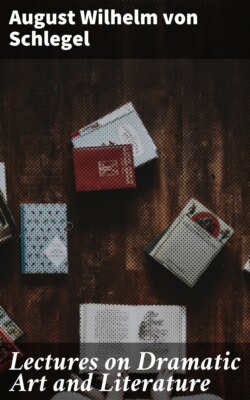Читать книгу Lectures on Dramatic Art and Literature - August Wilhelm von Schlegel - Страница 33
На сайте Литреса книга снята с продажи.
PREFACE OF THE TRANSLATOR.
ОглавлениеTable of Contents
The Lectures of A. W. SCHLEGEL on Dramatic Poetry have obtained high celebrity on the Continent, and been much alluded to of late in several publications in this country. The boldness of his attacks on rules which are considered as sacred by the French critics, and on works of which the French nation in general have long been proud, called forth a more than ordinary degree of indignation against his work in France. It was amusing enough to observe the hostility carried on against him in the Parisian Journals. The writers in these Journals found it much easier to condemn M. SCHLEGEL than to refute him: they allowed that what he said was very ingenious, and had a great appearance of truth; but still they said it was not truth. They never, however, as far as I could observe, thought proper to grapple with him, to point out anything unfounded in his premises, or illogical in the conclusions which he drew from them; they generally confined themselves to mere assertions, or to minute and unimportant observations by which the real question was in no manner affected.
In this country the work will no doubt meet with a very different reception. Here we have no want of scholars to appreciate the value of his views of the ancient drama; and it will be no disadvantage to him, in our eyes, that he has been unsparing in his attack on the literature of our enemies. It will hardly fail to astonish us, however, to find a stranger better acquainted with the brightest poetical ornament of this country than any of ourselves; and that the admiration of the English nation for Shakspeare should first obtain a truly enlightened interpreter in a critic of Germany.
It is not for me, however, to enlarge on the merits of a work which has already obtained so high a reputation. I shall better consult my own advantage in giving a short extract from the animated account of M. SCHLEGEL'S Lectures in the late work on Germany by Madame de Staël:—
"W. SCHLEGEL has given a course of Dramatic Literature at Vienna, which comprises every thing remarkable that has been composed for the theatre, from the time of the Grecians to our own days. It is not a barren nomenclature of the works of the various authors: he seizes the spirit of their different sorts of literature with all the imagination of a poet. We are sensible that to produce such consequences extraordinary studies are required: but learning is not perceived in this work, except by his perfect knowledge of the chefs-d'oeuvre of composition. In a few pages we reap the fruit of the labour of a whole life; every opinion formed by the author, every epithet given to the writers of whom he speaks, is beautiful and just, concise and animated. He has found the art of treating the finest pieces of poetry as so many wonders of nature, and of painting them in lively colours, which do not injure the justness of the outline; for we cannot repeat too often, that imagination, far from being an enemy to truth, brings it forward more than any other faculty of the mind; and all those who depend upon it as an excuse for indefinite terms or exaggerated expressions, are at least as destitute of poetry as of good sense.
"An analysis of the principles on which both Tragedy and Comedy are founded, is treated in this course with much depth of philosophy. This kind of merit is often found among the German writers; but SCHLEGEL has no equal in the art of inspiring his own admiration; in general, be shows himself attached to a simple taste, sometimes bordering on rusticity; but he deviates from his usual opinions in favour of the inhabitants of the South. Their play on words is not the object of his censure; he detests the affectation which owes its existence to the spirit of society: but that which is excited by the luxury of imagination pleases him, in poetry, as the profusion of colours and perfumes would do in nature. SCHLEGEL, after having acquired a great reputation by his translation of Shakspeare, became also enamoured of Calderon, but with a very different sort of attachment from that with which Shakspeare had inspired him; for while the English author is deep and gloomy in his knowledge of the human heart, the Spanish poet gives himself up with pleasure and delight to the beauty of life, to the sincerity of faith, and to all the brilliancy of those virtues which derive their colouring from the sunshine of the soul.
"I was at Vienna when W. SCHLEGEL gave his public course of Lectures. I expected only good sense and instruction, where the object was merely to convey information: I was astonished to hear a critic as eloquent as an orator, and who, far from falling upon defects, which are the eternal food of mean and little jealousy, sought only the means of reviving a creative genius."
Thus far Madame de Staël. In taking upon me to become the interpreter of a work of this description to my countrymen, I am aware that I have incurred no slight degree of responsibility. How I have executed my task it is not for me to speak, but for the reader to judge. This much, however, I will say—that I have always endeavoured to discover the true meaning of the author, and that I believe I have seldom mistaken it. Those who are best acquainted with the psychological riches of the German language, will be the most disposed to look on my labour with an eye of indulgence.
